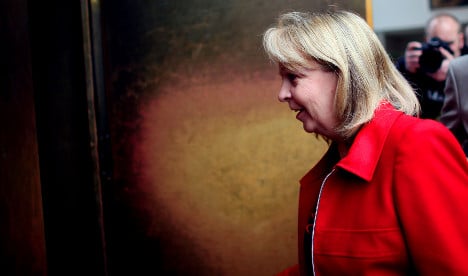Germans may be relatively resigned to Merkel’s tough-love austerity policy in Europe, but voters in Sunday’s elections in North Rhine-Westphalia – hastily re-branded as a referendum on Merkel – abandoned her party in droves for the pro-stimulus Social Democrats.
In what was the worst-ever result for Merkel’s Christian Democrats in the western state, the CDU took just over 26 percent of the vote, compared with 39 percent for the main opposition SPD.
Commentators on Monday said the result sealed the downfall of Conservative Environment Minister Norbert Röttgen, once tipped to succeed Merkel in the top job.
At the same time, it signalled the national rise of Social Democrat Hannelore Kraft, who German papers are now dubbing the Merkel of the left.
“Within eight weeks,” wrote the Süddeutsche Zeitung, “Röttgen has turned from a shiny politician who achieved much, wanted much more and dared to do anything, to a former chancellor candidate in-waiting.”
Röttgen’s campaign in North Rhine-Westphalia ran into trouble when he failed to commit to staying in opposition in the region if he lost Sunday’s vote.
He later had to backtrack after reportedly irking party allies by saying the NRW vote was a referendum on Merkel’s policy on Europe, in what the local paper Aachener Zeitung called a “last minute scramble” which smacked of “rhetorical bankruptcy.”
“The CDU election campaign was a terribly ragged blend of unaddressed issues, unformulated messages and a candidate who was not in the least bit convincing.”
“This mixture of the wrong strategy, the failure several times to give concrete answers and at times, arrogant pride, could not lead to success,” wrote the paper.
Röttgen’s gamble with making the election about Europe certainly backfired and could not come at a worse moment for Merkel. The dismal result for her party comes as national elections in Greece and France signalled a wave of protest against Merkel’s austerity strategy for Europe.
And on Tuesday Merkel will host French president-elect Francois Hollande who campaigned on a pledge to renegotiate the Euro zone’s fiscal pact for tighter budgetary rigour which Merkel says is crucial to economic recovery.
But the defeat is part of a wider crisis for the right, said the Westfälische Nachrichten. The Conservative campaign made the party look “outdated” and backward-looking.
Now, the paper said, the party would need to do some soul-searching after the defeat to find out whether their candidates “embody today and tomorrow, or yesterday.”
That, said the Süddeutsche Zeitung was “what makes the scale of this defeat so bitter for the future of the [party], because Röttgen actually stands for a modern, enlightened, green-tinged CDU.”
Following his downfall, the paper predicted “the Conservatives in the party will gain the upper hand.”
And the Conservatives are misjudging the current rise of “semi” left-wing parties – the Social Democrats, Pirates, Greens and the Left – endangering their chances, the paper said.
“A CDU … that is still against the minimum wage and pays women a bonus to stay at home has poor chances in a Germany with a growing semi-left majority,” read the commentary.
Meanwhile, Social Democrat incumbent NRW state president Hannelore Kraft has emerged as a fighting force in German politics, who some say could even rise above her male party colleagues to stand against Merkel in national elections next year.
“Hannelore Kraft is a Merkel in red,” wrote the Frankfurter Rundschau. Although their political positions on debt are polar opposites – unlike Merkel, Kraft doesn’t have a problem with the government getting into debt – the paper argued the “two women have a lot in common.”
Both have a “human, even motherly charisma” and do not make voters feel “insecure, but try instead to give them security in uncertain times.” The politicians “let others lead the heated debates” and “inspire trust,” said the commentary.
“Politicians like Merkel and Kraft chime so well with many people’s attitude to life.” observed the Berliner Zeitung.
“It will happen, is their central message – we’re sorting it out.” Where the problems are serious and need action, say the women, “we will remain cautious, not risk too much.”
And according to the Rhein-Neckar-Zeitung in Heidelberg, Kraft has the potential be able to reconnect her party to its traditional values and grassroots ideals of social equality.
Kraft “just might be [the one to] strengthen the Social Democrats belief in their own values. Since Sunday in NRW the SPD has become a party of mass appeal once again.”
Kraft is now likely to form a coalition with the Greens in the state parliament who scored 11.5 percent.
The Local/jlb




 Please whitelist us to continue reading.
Please whitelist us to continue reading.
Member comments